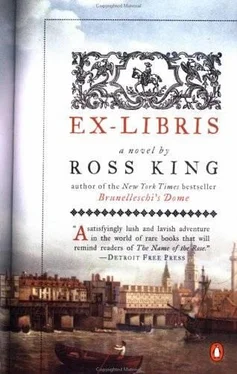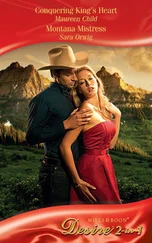As Ficino busily translated the fourteen books from Greek into Latin there arose in Florence and then throughout the rest of Europe dozens of rumours about the existence of more Hermetic manuscripts, in Macedonia and elsewhere, all still awaiting discovery. Some twenty more parchments were eventually recovered, after much bribing of priests and ransacking of temples, but all were versions or fragments of the same fourteen books, and three more besides, so that the total number of Hermetic texts in existence stood at seventeen. A century after Cosimo's death, the Greek text of the Macedonian parchments was published in Paris, and afterwards both copies of the Corpus hermeticum -the one Latin, the other Greek-went through many editions and emendations, all of which Sir Ambrose had, it seemed, dutifully collected: as many editions and translations as were printed throughout Europe in the past two hundred years.
Alethea had beckoned me forward to the shelves to show how her father owned the editions prepared by Lefèvre d'Étaples, Turnebus, Flussas, Patrizzi, Rosseli, even Trincavelli's edition of Johannes Stobaeus, a Macedonian pagan who had collected together some of the Hermetic works more than a millennium earlier. But none of these collections, she claimed, contained the eighteenth manuscript, The Labyrinth of the World , the first Hermetic text discovered in almost two hundred years.
I had watched sceptically as she stood beside the shelf and ticked them off one by one, thinking what a pity it was that, on these volumes at least, Sir Ambrose had wasted so much money. All were handsomely bound, it was true, and I could have sold most of them in a matter of days to any one of a dozen collectors. But fifty years ago the great Isaac Casaubon had demonstrated how the entire Corpus hermeticum -this supposed fountainhead of the world's most ancient magic and wisdom-was nothing more than a fraud, the invention of a handful of Greek scholars living in Alexandria at some time in the century after Christ. So of what possible value or interest for anyone was one more book, one more of these fakes?
The coach forded the thin stream, its wheels tossing curtains of water to either side. The down payment gold sovereigns-an even dozen of them-chimed softly in my pockets. I closed my eyes and didn't open them, for all I remember, until we reached the smoke of London, which I swear had never smelled so good.
The battle for Prague lasted less than an hour. Frederick's soldiers and their feeble earthworks were no match for the Imperial hordes with their 24-pound cannon-balls and flintlock muskets. The artillery ripped apart the trenches in front of the Summer Palace, then the musketeers went to work, balancing their weapons on forked rests and firing on the Bohemian infantry skidding and tumbling down the hillside. Those who escaped the musket-balls were cut down by the sabres of the cavalry who came sweeping through the game park on their war-horses a few minutes later. Those who escaped the cavalry spilled through the gates and into the castle or, failing that, leapt into the Vltava. They tried to swim the river at its bend, hoping to reach the Jewish Quarter or the Old Town, to put water between themselves and the rampaging enemy.
Others too were trying to escape across the Vltava. A convoy of overloaded coaches drawn by mules and dray-horses was jostling three abreast on the bridge, stretching all the way across the river and filling Charles Street as it wound its narrow channel through the rows of houses and towards the Old Town Square. The Queen herself was in the middle of the turbid flow, her bags hastily packed and then piled atop the roof like those of a gypsy or a tinker. A few minutes earlier she had been wrapped in a furred cape and bundled into the royal coach. Now the brocaded window-curtains did a sad shuffle as the coach teetered along the bridge, its wheels grinding against those of tumbrels and handcarts pulled or pushed by her fleeing subjects. The statues of saints wavered slowly past. They had been decapitated on her orders a few months earlier and now made an eerie sight. Then the wooden statue of the Virgin lurched into view, another wavering ghost. But the driver shouted and showed the whip to his horses. The Queen would cross into the Old Town after all, Holy Mother or not.
Emilia was also crossing into the Old Town. She had fled through the Spanish Rooms with Sir Ambrose, then through the castle; which was empty by then except for a few servants who were trundling hand-barrows piled with furs and casks of wine across the courtyards, claiming what they could before the Imperial troops breached the gates and the looting began in earnest. There would be little enough for them in the library, though. Two of its rooms were ablaze; the flames had filled the corridors with clouds of black smoke and then cast a gaudy, flickering light across the bastion garden and the onion-shaped dome of the cathedral. The cannon-ball had been heated on a brazier and so flames leapt through the wreckage of the wall seconds after it struck. Sir Ambrose had flailed at them with his cape, his enormous shadow vaulting on the wall behind him, but he was beaten back as the flames rose upwards, blackening the plastered ceiling, then the air itself. Spinning round, he had thrust out a black-gloved hand.
'Come! This way!'
In the courtyard outside he had caught the reins of a riderless horse, then leapt astride and pulled her up behind him. It was an old hackney horse, a beast more used to carts than riders, but Sir Ambrose rode it hard, spurring it down the steep descent into the Lesser Town. Emilia clung to the hind-bow of the saddle as they scrabbled along the steps, horseshoes sparking.
Before them lay the Lesser Town Square, where the river of mule-carts split into two arms at the plague column, then merged together, thicker than ever. Already she could see the pinnacled bridge tower shifting against the irregular ground of spires and vanes crowded together in the Old Town.
Where were they headed? Sir Ambrose had said little since leaving the library, merely issuing terse commands to follow him, to hold tight, to duck her head as the horse passed under each keystone. He had not even bothered to introduce himself-he had the manners of a Turk, she would discover, even at the best of times. But already she could guess who he was. She knew that the tall Englishman was the agent who had brought the Golden Books to Prague along with dozens of other parchments from Constantinople-those ancient works that Vilém claimed had not seen the light of day since the Sultan Mehmet captured the city in the year 1453. But Vilém had told her nothing of the Englishman's return to Bohemia. Evidently his visit was sub rosa , or 'under the rose', as the ambassadors termed it. She knew of his presence only because gossip in the Královsky Palace claimed he had come to Prague not to buy books for the Spanish Rooms, as of old, but to sell them, to trade them for soldiers and musket-balls.
The horse overtook the ragtag procession on the bridge, barrelling past the carts and dray-horses and cantering into Charles Street. Here on the opposite side of the river their route suddenly became more circuitous and involved, their pace even quicker. Sir Ambrose split away from the herd, kicking the horse to a gallop and guiding it through a succession of darker and narrower streets that wound deeper into the Old Town. Emilia, a poor rider, teetered out of her balance and had to grasp handfuls of his cloak to keep from tumbling into the street. The hilt of his sword pressed against her hip. It was one of those curved blades, wide at the tip, that she knew from her reading was called a scimitar-something else that Sir Ambrose must have brought back from Constantinople. She could also see a pistol tucked into a holster on his belt and another in his boot. She closed her eyes and tightened her grip.
Читать дальше












